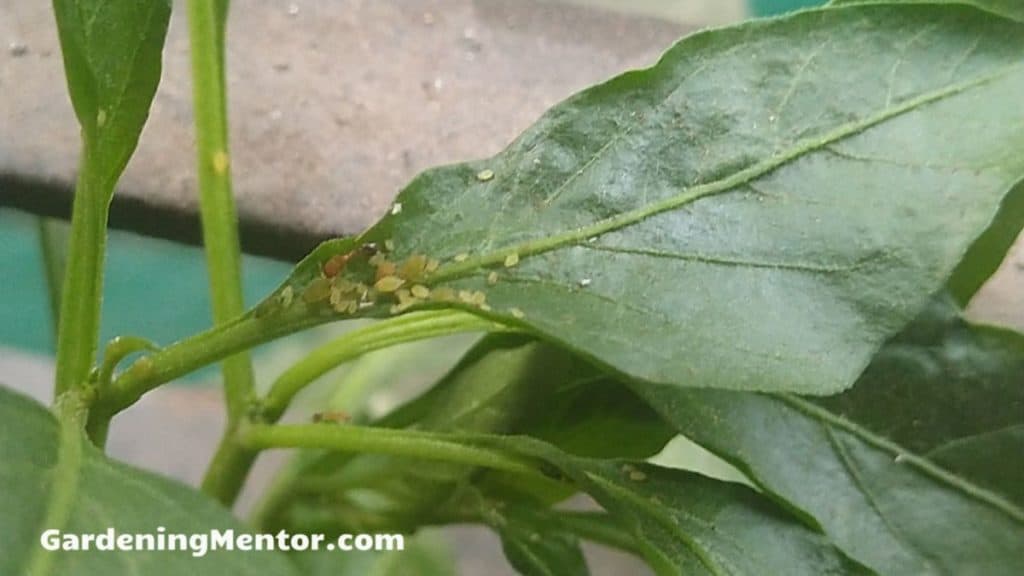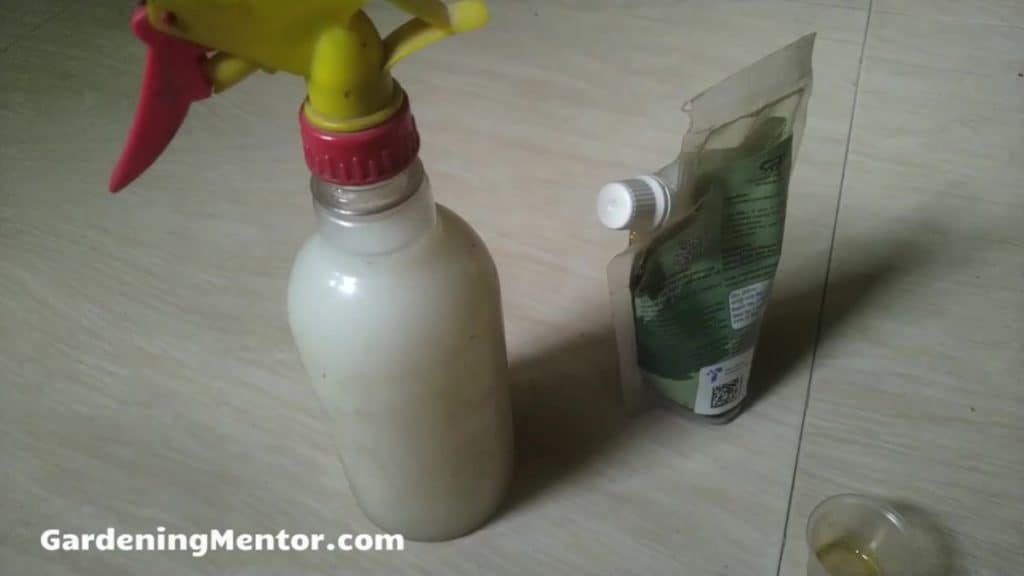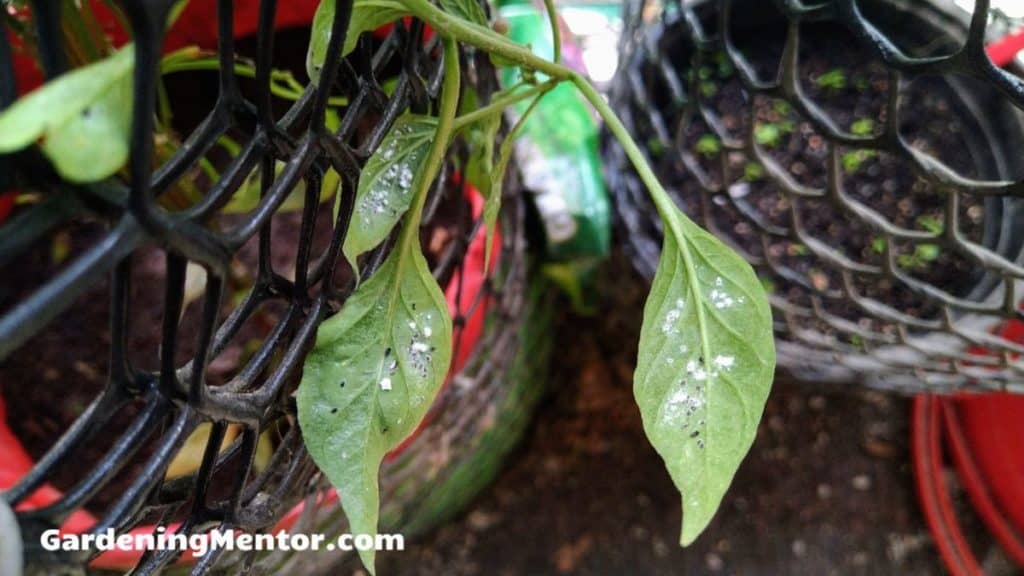I found many gardeners have the same problem as I have. The problem of ants crawling all over the potted plants in the garden. But are ants harmful to our plants and should we do something about it?
Ants will not kill potted plants because they don’t attack the foliage. However, ants farm sap-sucking insects such as aphids because they produce honeydew that ants consume. They protect these pests from predators while farming them.
I talked to some gardeners about ants in potted plants and I got mixed information from them. Some feel they could be beneficial but others don’t want them in their plants.
Here is a chart I created from the survey of a few gardeners. It shows that some find ants beneficial, others find them harmful and a few don’t think they do either.

Benefits of ants in potted plants
Ants may pollinate the plants
Some gardeners find ants beneficial because they help pollinate their potted plants such as peonies. But I think it’s much better to rely on other pollinators like bees or butterflies than ants.
Ants may get rid of pests
Ants would attack some of the pests that approach your potted plants. This would help keep your potted plants free from these pests and the diseases they carry.
Ants can aerate potting soil
Ants that move through the potting soil will help aerate it. This makes the potting soil texture good for air and moisture to reach the roots of your potted plants.
They’re not horrible because they aerate the soil but they’re also kind of bad because they’ll fight to protect aphids because they like to eat the honeydew that aphids produce. – Emma
Problems that ants create in potted plants
Ants can harm plant roots
The main problem some gardeners found with ants is they attacked their plant roots. One gardener’s lemon trees were destroyed due to the ants. Another gardener’s broccoli, cauliflower, and Brussels sprouts were damaged due to them.
Ants can protect plant pests
Ants love to consume the honeydew that pests like aphids and whiteflies produce. This makes them farm these pests and protect them from their predators such as ladybirds and hoverflies.
These pests will suck the sap out of your potted plants causing a lack of nutrients in them. If you don’t take care of these pests, eventually your plants could die.

Ants can attack beneficial insects
I already mentioned that ants could attack predators that want to eat pests like aphids and whiteflies. They will also attack pollinators like bees if they get too close to them.
Ants kill my broccoli, cauliflower and Brussels sprouts. They burrow down the roots and it immediately stunts the growth followed by dead plants. Seems like if I do anything to the plant they are nesting in, they move to the next plant. I just leave the affected plant alone and they stay there. – Frank
How do I get rid of ants on my potted plants?
I prefer to use methods that prevent ants from reaching my potted plants. I find it’s more humane to keep them away. But there may be times when you have to take the drastic measure of getting rid of them.
Here are some of the methods you can try in your potted plants. I don’t recommend using chemicals like insecticides in your potted plants as it affects the plants and animals. So use organic methods if you need to get rid of the ants.
1. Use vinegar spray to get rid of ants
You can use vinegar with 5% concentration that you find at home.
In a spray bottle, mix three parts white vinegar, 1 part water, and 1 teaspoon dish soap. Spray the solution on the soil of your pot that is infested with ants.
You can also spray the vinegar solution every week on the potting soil to keep ants away from the plant.
Ensure not to use a high concentration of vinegar because it is acidic and could harm your plants. Avoid spraying it on the foliage of the plants and keep it mainly for the potting soil.
2. Use peppermint oil to get rid of ants
Ants in plants don’t like strong odors and peppermint oil is one of them you can use.
I recommend diluting the peppermint oil before use otherwise you may end up damaging your plants. You can mix 5 drops of the peppermint oil in 5 oz of water. Mix it well and add the solution to a spray bottle.
I suggest you spray it on a few leaves of your potted plants and check them after 24 hours. You can use the spray if there are no signs of problems on the leaves.
Spray this peppermint oil solution on the affected plant and potting soil to get rid of the ants. You can also spray this solution once a week to keep ants away from your potted plants.
3. Grits could be used to deter ants
One gardener mentioned using grits to get rid of ants. She told me that the ants carry the grits to the queen and it kills her. This causes the ants to move away from that location.
The idea is that you place dry grits near the base of the plant so ants will consume them and carry them to their nest. The grits will expand in their stomach causing them to die.
Some other gardeners mentioned that this does not kill the ants and is a myth. The ants may enjoy and prefer the grits to your plants.
I don’t know how much truth there is to this method, but you can try as there’s no harm in it. You must use the old-fashioned dry grits rather than the instant ones.
4. Diatomaceous earth could be used against ants
Diatomaceous earth is organic material that is made from the fossilized remains of microscopic sea creatures.
This is a fine powder that is harmless to humans and pets but kills some insects. The material has sharp, microscopic edges that cut through the exoskeleton of ants as they move over it. This causes loss of moisture so the ants dehydrate and die after some time.
You need to sprinkle the diatomaceous earth on the potting soil and plants where you find the ants. It’s best to sprinkle this after any rains because the powder will get washed away.
You want to use a mask to protect yourself from inhaling the powder especially if you suffer from respiratory problems. You could mix it in water and spray it in the potted plants as well.
Once the water dries up, the diatomaceous earth will become active and work towards killing the ants. You may need to sprinkle this powder a few times every week until all ants are gone.
Diatomaceous earth might get rid of them. I’d be afraid that eat my roots. I had huge Meyer lemon trees. All of a sudden they both died. When we went to remove them, the entire root systems were destroyed by ants. – Sheila
5. Soak the potted plant in water to get rid of ants
This is a simple method to get the ants out of your potted plants. But it will work for small pots that you can lift and place in a larger one.
You fill a larger pot or tub with water and place the potted plant inside it so the potting soil can soak up the water. The ants will come out of the potting soil as they start to drown.
A gardener friend suggested I spray bug spray as the ants come out to kill them but I’m not a big fan of using such chemicals on my plants.
Depending on the size of the planter I fill a bigger bucket with water and quickly place the one with ants in the water. When they come to the surface I spray them with bug killer. I only do that if the colony is big enough to kill the plant, or they are being aggressive. – Deborah
6. Dispose of the potting soil and sterilize the pot
This should only be used as a last resort if you struggle to get the ants away from your potted plant. You can remove the plant and potting soil from the pot.
You can sterilize the pot by soaking it in a solution that contains 1 part bleach and 9 parts water for an hour. Then rinse the pot with clean water and let it dry in the sun before you can use it.
Throw away (or reuse) the old potting soil and add a fresh batch to the pot. You can now place the plant back into the potting soil.
7. Use insecticidal soap or neem oil to get rid of ants
You can mix 1 tablespoon of insecticidal soap with a quart of water in a spray bottle. Shake it well and spray it on the ants to get rid of them.
You could also use a neem oil solution to do the same. Mix 1 tablespoon neem oil with a quart of water. Add 1 teaspoon of dish soap.
Add this solution to the spray bottle and shake well so the neem oil mixes with the water. Spray this on your potted plants to get rid of ants and other pests.
Read more:
How to prevent ants from reaching the potted plant?
Sacrificing a plant to keep the ants away
If you don’t want to kill the ants you can still keep them away from your precious potted plants. You can grow some sacrificial plants that ants can thrive on.
You can keep some of their favorite foods like honey or sugar in these plants to attract the ants. And you keep your other potted plants far away from these sacrificial plants.
The idea is that the ants will be happy on the sacrificial plants and not bother to reach your other potted plants.
Use citrus to keep ants away from the plant
Ants don’t like the acidity of citrus and you can use this to protect your potted plants. The easiest way to do this is to spray some lemon juice on the potting soil.
I would suggest you be careful not to spray a lot of it because this is acidic and can affect your plants. Mix 1-2 tablespoons of the juice with a quart of water and put it in a spray bottle. Spray this on the potting soil to keep the ants away.

Put some spices near the plant
Ants don’t like the scent of strong spices and you can use this to keep them away from your potted plants.
You can use spices like cinnamon, pepper, cayenne, cloves, or garlic powder. Sprinkle this around the base of the plant to form a circle.
You may need to do this every week if you have a common occurrence of ants in your potted plants.
Add natural deterrents to the potting soil
Some essential oils could be used to keep ants away. People suggested peppermint oil, thyme oil, or lavender oil. You could mix 2-5 drops of the oil with a quart of water in a spray bottle and spray it on the potting soil as well as plant.
I would suggest you test this spray on a few leaves before spraying it on the entire plant. Spray it and let it sit on the leaves for 24 hours. Check if your plant is having any issues with the essential oil or not.
Only use the spray on your plant if you find no reaction of the plant to the essential oils.
You can use other natural materials like baking soda, coffee grounds, or strained tea leaves to protect your potted plants from ants.
Sprinkle the materials around the base of your potted plant so the ants will stay away from the plant.
Grow herbs together with the potted plant
Ants tend to avoid plants such as herbs that have a strong odor. So you can grow herbs either near the potted plants or together with them to keep the ants away.
Some herbs you can grow with your potted plants include lavender, thyme, sage, peppermint, catnip, and rosemary.
Why are ants attracted to your potted plants?
Warm and comfortable environment of the plant
Ants look for a warm and comfortable place to build their nest and your potted plants may be just the environment they need.
Food source near the potted plant
If there is a food source near your potted plants, ants will be attracted to it. Avoid keeping any food materials near the potted plants. And keep the place clean and free from debris.
Pests like aphids and whiteflies suck the sap out of the leaves and deposit honeydew on them. Ants are attracted to this as a food source and will reach your potted plants.

So prevent such pests from reaching your potted plants. Take care of them as soon as you find them start to infest the leaves of your potted plants.
Brought home with transplants
If you tend to buy transplants for your container garden, ants or their eggs may be present in the seedling you purchased and brought home.

Fact Checked, Written, and Published by Kevin Rodrigues
Kevin is the founder of Gardening Mentor, a website that aims to teach people to grow their own food in a limited space. As a self-taught gardener, Kevin has spent several years growing plants and creating gardening content on the website. He is certified in Home Horticulture and Organic Gardening from Oregon State University. He has a Post Graduate Diploma in Horticulture and Landscape Gardening from Mumbai University.
Read more
